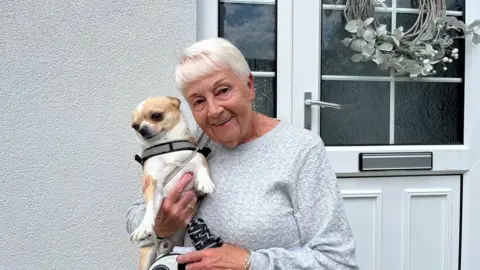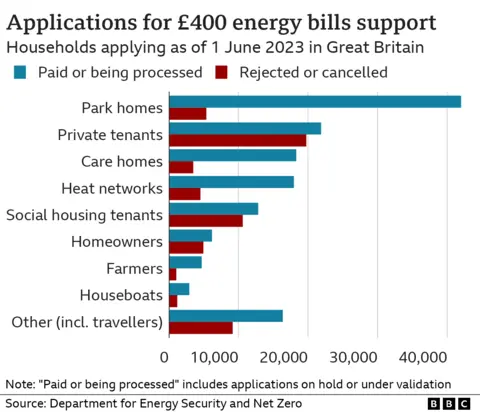Energy bill support: More than 700,000 households miss out
 BBC
BBCMore than 700,000 households in Great Britain have missed out on £300m worth of support for energy bills, according to BBC analysis of government figures.
These are households in places such as park homes and houseboats who did not have an energy supplier to apply a one-off £400 payment automatically.
The government said in February that more than 900,000 such households were eligible.
But only about 200,000 applications were made before the 31 May deadline.
The government announced last year that all households would get £400 taken off their energy bill over winter. For households who pay their bills by direct debit, the support was given through monthly payments from October to March.
However, for those with non-conventional energy set-ups the government launched the £400 Energy Bill Support Scheme Alternative Funding earlier this year.
BBC Verify analysis of data from the Department for Energy Security and Net Zero shows that of the more than 200,000 applications made under the scheme:
- almost 125,000 had already been paid by the beginning of June
- nearly 6,000 had been approved but not yet paid
- almost 13,000 were on hold or being validated by local councils
- around 60,000 were rejected or cancelled.
Matt Cole from the charity, the Fuel Bank Foundation, said it was disappointing that so many people had missed out and believed it was down to a number of factors.
"The launch of the scheme in spring this year rather before winter when it was needed most, the reliance on families self-identifying that they were eligible rather than them automatically receiving it, and the somewhat complex process to claim help will all have contributed."
The government said it had spent more than £50m "supporting 130,000 households without a domestic energy supplier".
This data suggests just over £300m of the possible £360m in Great Britain had not been claimed before the deadline.
People who thought they were eligible needed to apply on the government website or call a helpline, which is what Mark, who lives on his narrowboat, did.
"A lot of people [on canal boats] tried to put an application through for claiming for it [but] we hit a barrier when it said: 'Do you live in a marina or are you off grid?'
"The minute you clicked 'off grid' you went through to a box that said 'you are not eligible at this time'."
Mark uses three and a half bags of coal for his multi-fuel stove each week in winter. He had been paying around £9 per bag but last winter the price nearly doubled.
"[The £400 payment] would've been a great help. That money's had to come from somewhere so it's had to come out of the rest of my budgeting or my savings.
"It would've made my winter a bit easier, maybe I could have spent a bit more money on the grandkids."

A government spokesperson said: "We spent billions to protect families when prices rose over winter, covering nearly half a typical household's energy bill.
"We're now seeing costs fall even further with wholesale energy prices down by over two thirds since their peak.
"We are urging councils to process applications and complete final checks as quickly as possible to ensure all those eligible receive the support they need."
The government said anyone who did not apply before the deadline should visit its Help for Households page.
Carol lives on a park home site south east of Runcorn. She says the application process was simple, but she was forced to apply three or four times because she kept getting rejected.
"We got refused, I don't know how many times. I kept going, I wouldn't give up. Because I thought, 'Why should I give up?' I've worked all my life, I've paid into the system.
"[The £400] was very important because 99.9% of people on these sites are all retired and a lot of them only have a basic pension, or maybe a bit of a top-up pension.
"But it's not going very far because food's gone up, petrol's gone up, so the £400 was absolutely a godsend."
Park homes were the largest single group seeking the £400 support, with 47,400 households out of the 203,580 who applied.
Tenants in private accommodation had the highest rejection and cancellation rates, with 47% of applications from this group being stopped. Applications were rejected if people had already received support, made a duplicate application or were not eligible.
The Office for National Statistics estimated that about 137,000 care home residents in England pay for some or all of their care, and these were eligible to apply for the support.
There were just under 22,000 applications from households in care homes across Great Britain.

In a similar scheme for Northern Ireland, 28,000 households were eligible for £600 worth of support, totalling around £16.8m.
There were just over 8,000 applications in Northern Ireland from those without a domestic electricity supply, with just over 4,000 already paid by 1 June 2023 and 160 awaiting payment.
Of the rest, just over 2,700 were cancelled or rejected and just over 1,000 were still being worked on. This means almost 23,000 Northern Ireland households may have missed out on an estimated £13.6m.
You can hear more on this story on the Money Box podcast.

Here are some energy saving ideas from environmental scientist Angela Terry, who set up One Home, a social enterprise that shares green, money-saving tips:
- Get a water-efficient shower head free of charge from your water company and use showers rather than baths
- Consider loft insulation, which she says costs around £460 for a typical semi-detached home and could save £355 a year on gas bills
- Hang out washing instead of using a tumble dryer
- Use windy days to feel where draughts are in the house. Wetting the back of your hand helps to locate them, then use insulation or draught-proofing tape

